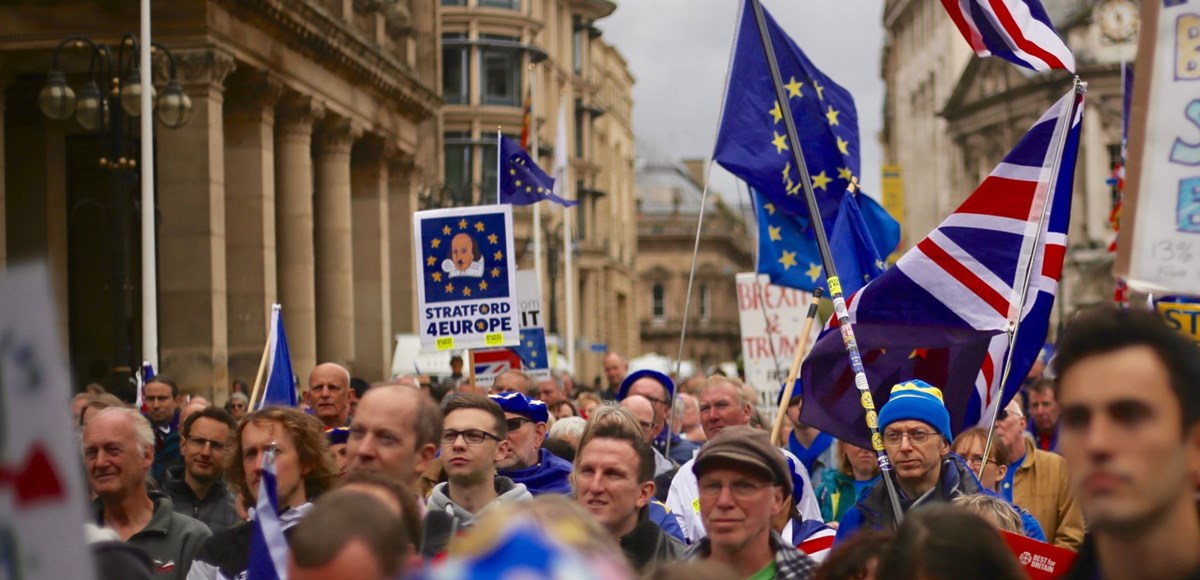In the run-up to Britain’s referendum on its membership in the European Union in June 2016, free-market proponents were split.
There were those who saw Brexit as an opportunity to escape from a vast protectionist bloc, a sort of economic Festung Europa, which accounts for an ever-smaller share of British exports and the global economy. EU rules not only require pallets arriving from non-member states to be heat-treated or cleaned to prevent contamination but also to have specific markings to confirm they meet certain standards. If Britain leaves the EU without a deal, it would become illegal, again under EU rules, to buy a ham sandwich in Derry that you intend to eat seven miles up the road in Bridge End. So much for the great trade liberalizer.
But there were others—decent, clever people who reached the opposite conclusion. One of their arguments was that the EU represented a bulwark against statist economic policies that would be imposed by the parliament at Westminster. That the EU prevents democratically elected governments from pursuing such policies is a good thing, on this argument, because freedom is more important than democracy. Sadly for those Free Market Remainers, the EU is wrecking their argument.
Raising Ireland’s Taxes
In 2008, Ireland voted to reject the European Constitution, in part to protect their successful low tax policies. But in the EU, votes are not opportunities for electorates to make decisions but for them to rubber-stamp decisions already taken by EU leaders. The Irish had given the wrong answer, as they had when they voted "No" to the Nice Treaty in 2001, so, as with the Nice Treaty, they were made to vote again. They were given assurances that the new Lisbon treaty—the renamed constitution—would, among other things, safeguard their taxation policies. In 2009, they dutifully voted yes to Lisbon.
But the EU never abandons an idea, it only delays it. It is gunning for Ireland’s low taxes once more. Presently, some decisions on tax policy have to be taken unanimously, giving countries like Ireland a veto. But the European Commission—the unelected executive body of the EU—wants to end that. The low taxes upon which Ireland’s economic miracle are based are unlikely to long outlive unanimity.
Ireland’s partners in the EU could have looked at that country’s success and thought, "Here is something to emulate." Instead, they see it as something to stop. And the EU has the means to do so.
Even Worse, They Banned Memes
More recently, the European Parliament passed a new Copyright Directive. As The Economist explains:
The directive…seeks to update the EU’s copyright legislation in light of recent technological changes. Its most controversial elements…are Article 11, a “link tax” requiring social networks and news aggregators to pay publishers to display snippets of their output, and most of all Article 13, an “upload filter” making larger online publishers like YouTube responsible for copyright infringements in material uploaded by their users. The directive now goes to the Council, which is expected to ratify it on April 9th.
…Supporters include musicians and publishers who say that it will help to protect artists in an age where unauthorised copying is drastically easier than it used to be. Opponents, which include net freedom campaigners and the likes of Google, say it amounts to censorship and will curb the use of established material to make memes or other parodies.
And That’s Not All
The Economist continues:
…the Copyright Directive ought not to be viewed in isolation. By purporting to protect artists from the side effects of new technology, it represents a typical example of what Emmanuel Macron, the French president and a supporter of the reform, calls “l’Europe qui protège”, or “the Europe that protects”. Mr Macron believes that the rise of populism and public angst about globalisation demands an EU that, rather than merely welcoming the bracing winds of change, does more to shelter established interest groups from them.
Other examples of this increased EU protectionism include:
…the new Franco-German push (this one at odds with the Commission) to rejig competition rules to allow takeovers shielding European industry from unfair competition from American and in particular Chinese giants; new protections for European firms deemed strategically important; a more permissive approach to certain forms of state aid; digital consumer protections like the new General Data Protection Regulation; measures to tackle Russian-backed disinformation campaigns; a crackdown on tax avoidance; and tougher controls on migration at Europe’s outer borders and the pursuit of criminals within them. The European election manifesto of Germany’s Christian Democrats…was typical of the genre: “our Europe strengthens: security, peace and prosperity” it proclaimed (its most striking proposal was the creation of a “European FBI” to take on cross-border crime).
Supporters of EU membership have no more potent enemy than the nature and behavior of the EU itself. Free Market Remainers are just the latest to discover this.
Meanwhile, in Britain…
Of course, there is little encouragement for Free Market Leavers in the behavior of the parties at Westminster. Jeremy Corbyn’s Labour Party is increasingly socialist. Its flagship policies include renationalization of the railways, water and energy companies, and Royal Mail. Most depressing of all is the current state of the Conservative Party. Once led by Margaret Thatcher, who pounded a copy of Hayek’s The Constitution of Liberty on a desk and proclaimed “This is what we believe,” it has, under Theresa May, drifted back to the sort of empty-headed paternalism it embraced before Thatcher, for want of anything else.
Brexit Britain may well impose some bad economic policies, but it would only impose them on Britain.
Even so, nearly three years on, the Free Market Leaver’s case holds up better than that of the Free Market Remainers. Brexit Britain may well impose some bad economic policies, but it would only impose them on Britain. The EU, by contrast, allows France and Germany—who run it—to impose bad policy across all 28 member nations, as the push to raise Ireland’s taxes shows. The Free Market Remainer’s calculation—that they could buy economic freedom from the EU at the price of domestic democracy—collapses when the EU isn’t selling economic freedom anymore but Emmanuel Macron’s mangy statism. Why should his protectionism be any less noxious than Theresa May’s or Jeremy Corbyn’s?
Free marketeers have more chance of reversing bad policy imposed by a local parliament than we do bad policy imposed by a supranational bureaucracy. It is important that power be diffused. This is a key lesson of liberalism that Free Market Remainers totally neglected. By its actions, the EU is reminding them.

